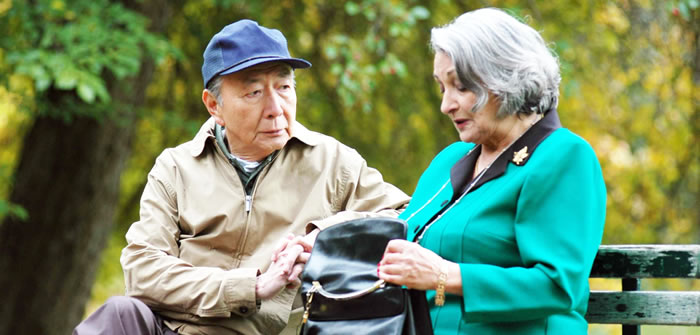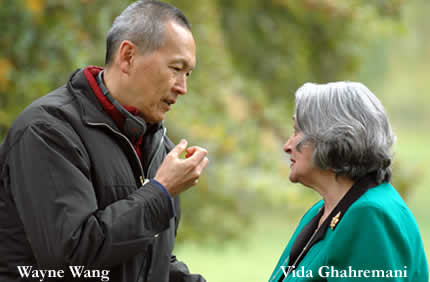 Born in Hong Kong, Wayne Wang is an accomplished director of American cinema best known for exploring the issues of East Asian diasporic identity in films like The Joy Luck Club, but he is also the director of Smoke, Last Holiday, and Maid in Manhattan. His new film, A Thousand Years of Good Prayers was released in the US September 19, 2008 after premiering at last year’s Toronto Film Festival.
Born in Hong Kong, Wayne Wang is an accomplished director of American cinema best known for exploring the issues of East Asian diasporic identity in films like The Joy Luck Club, but he is also the director of Smoke, Last Holiday, and Maid in Manhattan. His new film, A Thousand Years of Good Prayers was released in the US September 19, 2008 after premiering at last year’s Toronto Film Festival.
Bijan Tehrani: Your film, A Thousand Years of Good Prayers, is a film that contains many different layers. How did you come up with the idea of this film? Is it based on real events and characters, or is it totally fictional?
Wayne Wang: Well, it is based on a short story, in a collection of short stories, by writer Yiyun Lee. And knowing her, a lot of her characters actually come out of stories that she has heard, or from people she has met. When I was reading it, a lot of it resonated with some of my own experiences; coming from Hong Kong to go to school in the United States, learning a new language and culture, and having some differences with my father when he came over–all of that stuff. Also there was the idea of language, and how sometimes you may share more between someone who doesn’t have a common language. So things like that were all personal to me when I read it.
BT: It is very hard in a film like this, and with characters like this, which have extreme positions; to avoid any kind of judgments. But I think you avoid judging your characters quite nicely. How did 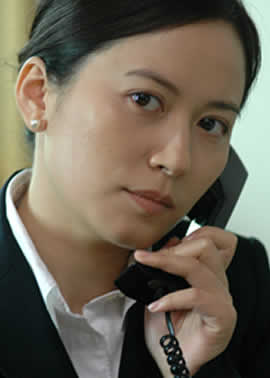 you accomplish this?
you accomplish this?
WW: Well, I’m of that type of personality. Maybe ten years ago I was talking to a director who told me that he always sympathized with his characters, even when they are evil. He said that in the end you have to understand your characters for their good and their bad, and not judge them. That had a big impact for me. My personality is like that anyway, and so when I treat my characters on screen I tend to take that same kind of position, so I can see their vulnerability, their weaknesses. I have to understand them and work with it.
BT: You also present a story of cultural clash, which is not only between foreign cultures, but also between families. How real is this kind of cultural conflict within immigrant communities within the U.S; this conflict between the older generation and the younger?
WW: Well, pretty common I would say, unless the parents are extremely enlightened and equally Americanized. There is the old culture and tradition that still exists, and on top of that what makes it even harsher in this case is the fact that they both went through the cultural revolution, which had a great effect on their relationship back then, and they could never quite get away with that; as much as they try to repress it and deal with it, it always comes up. So besides the cultural and generational differences, there are shared experiences that are very powerful.
BT: The relationship between your main character, Mr. Shi, and the female Iranian immigrant, Madam, is very interesting. Even though they can hardly communicate, and are from two completely different cultures, they find common ground. Was this in the original story?
WW: It was in the original story, and was kind of the backbone of the story. Yiyun was very interested in that they both share a lot of experiences from the past. For example, Mr. Shi had his experiences with the Cultural Revolution, and Madam with what happened with Iran and the eight years war. They both also have daughters, and both feel like they may have lost their daughters from this past experiences. Although not a whole lot is communicated, they share those experiences, and they feel it, and it is common between them.
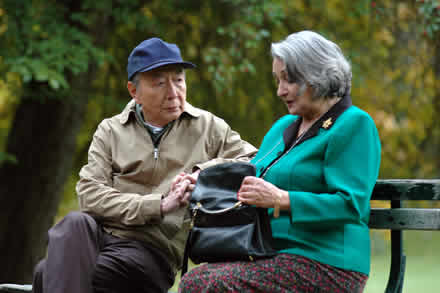 BT: The acting in this film is extraordinary, especially the young girl who plays Yilan, and Henry O, who plays Mr. Shi. How much were you guiding the actors, and how did you get such beautiful and natural performances out of them?
BT: The acting in this film is extraordinary, especially the young girl who plays Yilan, and Henry O, who plays Mr. Shi. How much were you guiding the actors, and how did you get such beautiful and natural performances out of them?
WW: Well, first of all I always believe that you have to cast them right. I think Henry O, who plays Mr. Shi, has had his own experiences that were quite close to the character. And Vida Ghahremani, who plays the Iranian woman, Madam, also had similar experiences. So that is one first big step. The second step is really to try to work with the actors so that they arte not acting, but are trying to find what is authentic about the scene, and try to express that, rather then showing that they can act. I always tell my actors to just be the character, more than anything else. So for me, directing actors is trying to get down to the core authenticity of that moment.
BT: Any future projects?
WW: I am working on a few things are the same time, but there is a very interesting book that I like, about a young Chinese woman living in London. It’s called Concise Chinese-English Dictionary For Lovers by Xiaolu Gou. It focuses a little bit more on a love relationship, but it also deals with the same things.
***
Vida Gharemani qualified for years as the most preeminent actress in late 20th and early 21st century Iran. She entered Persian film during adolescence, debuting in 1958 with a role in the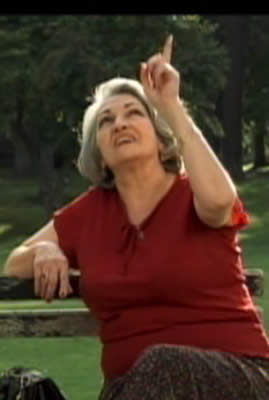
Farsi-language picture Storm in Our Town, and went on to work in a diverse array of genres. Gharemani achieved international crossover success as a middle-aged performer with a supporting role in director Wayne Wang’s gentle, thoughtful slice of life drama A Thousand Years of Good Prayers.
(Nathan Southern, All Movie Guide)
Bijan Tehrani: When did you learn that you would be playing this role? How was it offered?
Vida Ghahremani: Well that was by a very strange accident. Wayne was copying his script at home, and his copy machine stopped; it malfunctioned. He didn’t know what to do, so he took the script and went out to the print shop. The print shop owner was Iranian. Wayne was socializing with the owner, and he told her that he was going to make a film, and he needed a middle aged Iranian lady, and she said ‘I think I know somebody’, and this lady called my daughter. My daughter is the founder of Golden Thread Production, which has been around for ten years, and serves to introduce the Middle Eastern culture to the West through the theater. I was working with her over these ten years. This lady knew me, and she got my telephone number from my daughter, and she called me, and said ‘you don’t know me, but I know you, Wayne Wang, who is my friend and a very famous director.’ — I didn’t know anything about him at that time, which is very embarrassing – ‘he is looking for this and that, and shall I give your telephone number to him?’ I said yes, and so that was it. About eight hours later the casting director called me from New York and asked me to read the script that he sent overnight to me, and to film myself rehearsing a scene. All of these things happened in twenty-four hours. After that I met Wayne Wang, and he called me and said he saw my tape and wanted to have lunch. He said he was in San Francisco, and I was there as well, so we met each other, and that was very strange, because it seemed like we knew each other for a long time. That was a really good start.
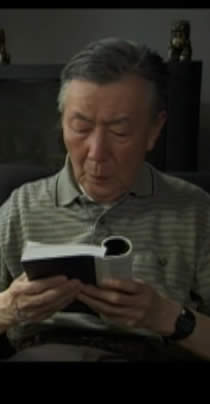 BT: How did you like the script? Did you find it interesting?
BT: How did you like the script? Did you find it interesting?
VG: Yes, I read it all night and through the morning; I couldn’t put it down. It was so touching, and there were so many small things that spoke to any immigrant to the United States, the land of opportunity.
BT: How was the experience of acting with an actor like Henry O?
VG: Ah, Henry O! I really respect him. You can’t believe how intimate we get together. He is so nice, such a gentleman. I can’t say more. It didn’t matter that we speak different languages, that we are different nationalities, and from two completely different places in the world. It seems that we are sister and brother. Even with Wayne it was like this! That was very strange.
BT: The scene when you are in the park speaking with Mr. Shi, was the director guiding you, or was he giving you more of a chance to act freely?
VG: I have worked with different directors. Some directors are artistic, some are technology oriented each director has a different point of view, and works differently with actors. Wayne is an actor’s director. We didn’t start immediately with the shooting. Firsy we meet everybody and had introduction party, we were talking and making jokes, and there was no tension between anybody. Everybody got involved so we were a group, no individuals. I was not Vida Ghahremani; I was a piece in “A Thousand Years Of Good Prayers”. At the party, Henry and I were talking to each other, talking about our lives and our children, unscripted, and Wayne was watching us on the monitor that he had. He got the best from of us sitting and talking, and when he wanted to record it on the camera, he got those things that he thought were nice between us.
BT: Have you seen the finished form of the film?
VG: I have seen the finished film at the Toronto festival, and I was so excited about it, I couldn’t watch it properly, because I was talking to the girls from “The Princess of Nebraska”. Those two girls can really act! They were not actors, but Wayne found them in the street in San Francisco. On the 24th will be the first time, I hope, that I can sit down and relax and really see the film.

